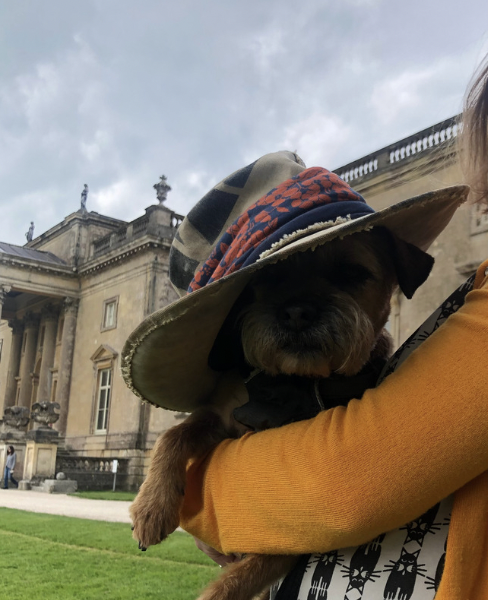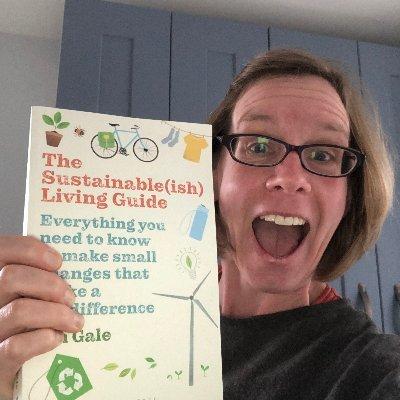Meet Jen Gale, Vet Sustain Director and founder of Sustainable (ish)
We have recently had the privilege of Jen joining our Board of Directors bringing with her a strong background in sustainability. Jen is a small animal veterinary surgeon who has followed an unintentional journey into sustainability. Continue reading below to learn more about Jen's.
Vet Sustain
Please introduce yourself Jen!
I qualified from the RVC in 2004 and worked in small animal practice for 11 years, before transitioning into a career in sustainability. My journey into sustainability was largely unintentional – I decided in 2012 that it would be a ‘fun challenge’ to try and spend a year buying nothing as a family, and that year opened my eyes to the impact that our lifestyles are having on the planet, and the positive changes that we could make.
I live in Wiltshire with my husband, our two sons, our Border Terrier Spud, and Speedy the 84 year old tortoise.

What is your current role and professional interests?
I run an online platform called Sustainable(ish), which is aimed at ‘ordinary tired non-greenies’, providing information, resources and inspiration for imperfect eco-action. I host a podcast, am the author of The Sustainable(ish) Living Guide and The Sustainable(ish) Guide to Green Parenting, and have a membership community called The Sustainable(ish) Clubhouse.
I do a reasonable number of corporate ‘lunch and learn’ type events, speaking to teams about imperfect sustainability and some of the swaps and changes that they can make.
In addition, I am a Carbon Literacy Trainer, and run Carbon Literacy courses for individuals, as well as for the veterinary profession in conjunction with Vet Sustain.
Having been on the Vet Sustain Greener Veterinary Practice Working Group for some time, I am delighted to now be a Vet Sustain Director, and it has been such a great way of finding my way back into the profession after leaving clinical practice.
What does a typical day look like for you Jen?
I’m sure everyone says it, but there is no such thing as a typical day. I spend a LOT of time online – whether that’s checking in with The Sustainable(ish) Clubhouse Facebook group, or catching up with members in our regular Zooms, or recording podcast interviews, or delivering lunch and learn sessions.
Carbon Literacy training is a pretty regular feature in my diary, with most of these sessions taking place during working hours, but I try to include evening courses periodically to try and ensure its accessible to those who can’t get time off work, or are in different time zones. I usually work a couple of evenings a week, but it’s not especially onerous sitting online and sharing something I’m super passionate about. Far less stressful and onerous than on-call used to be!
What is your favourite part of your job?
One of the things I love about being self-employed is the freedom and flexibility it provides, which has allowed me to build up a business at the same time as bringing up young children.
In terms of job specifics, the thing that makes me smile the most is hearing from people who have gone on and made a sustainable change after listening to a podcast, seeing something on social media, coming to a talk, or attending Carbon Literacy training. I often say that “nothing changes if nothing changes”, so hearing that people have been inspired to make a change is huge.
What is the most challenging part of your job?
Managing my eco-anxiety can be challenging, as I’m sure it is for everyone working in sustainability. It can be quite easy to get sucked into a very negative narrative when looking at climate stories in the news and online, and this can at times feel very overwhelming. This can often be exacerbated by working alone – there isn’t a team around me to lift me up, or to discuss concerns with. My work with Vet Sustain really helps with this – being part of such a brilliant team provides the boost that can sometimes be missing in my freelance work.
Do you have any tips for achieving a good work-life balance?
Running an online business and working from home can mean that the boundaries between work and home can feel very blurred. In the early days, I wasn’t great at switching off at the weekends, but I’ve got much better recently at leaving e-mails and social media unchecked over the weekend. Time off for holidays can be a challenge when you’re running your own business – it’s great to have the flexibility and not be limited to a certain number of weeks holiday, but switching off completely is a real challenge, as the email inbox never sleeps!
How do veterinary professionals currently help to drive sustainability?
Vet Sustain have done, and are doing brilliant work to drive sustainability within the profession. When I left practice in 2015, sustainability wasn’t being discussed at all, and now it’s so much more a part of the conversation at all levels. Obviously we have a role to play in reducing the carbon footprint of our practices, but I think we also have a huge role to play when it comes to influencing our clients and wider social norms. Having conversations with our clients about the changes we’re making as a practice flags to them that sustainability is important and is being tackled by all industries and sectors. In addition, we are trusted professionals who have a huge carbon footprint ‘under our influence’ when we start to think about the carbon footprints of the animals under our care. Whether that’s vets on farm talking to farmers about opportunities for carbon sequestration, or small animal vets talking to clients about lower carbon pet foods, there is huge scope here!
What do you feel are the major opportunities to drive sustainability in the veterinary sector?
Getting sustainability into the curriculums of all of the veterinary schools and veterinary nursing schools is a massive opportunity – imagine if every single new qualified vet and vet nurse graduated as Carbon Literate, and understanding not only the climate and nature impact of their future roles, but really importantly, the steps that they can take to reduce them.

What are your top tips for veterinary professionals wishing to take the first steps to drive sustainability in their roles?
Get educated – ‘sustainability’ can feel overwhelming and there’s a lot of information out there. Coming on the Vet Sustain Carbon Literacy course is a great way of making sure that you understand the science, the impact, and equips you to make better, more informed decisions, more of the time, which is essentially what sustainability is all about!